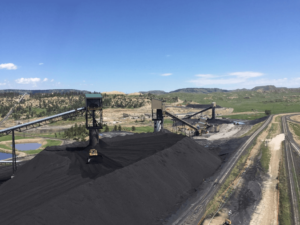
If we’re to take something away from our dominant fossil fuel-based energy system, it’s that too much of a good thing is a bad thing. With their subsidization, abundance, and high energy density, fossil fuels became an unprecedented way to relieve man and animal of work, so they became the energy source of ultimate convenience. This convenience cause us to abandon innovation and disregard of energy efficiency, becoming too reliant on our own natural resources and those of the OPEC nations. As a society we became complacent and remained complacent when we knew we had a problem. The system wasn’t broken, so innovation sat on the sideline, and then when it became broken, generation after generation remained in denial and passed the problem onto the next one. The short to mid-term economic boosts were prioritized over ecological health, energy efficiency, and energy sustainability, and are still being prioritized today.
With the market for coal dying in the U.S., coal exports have looked to overseas markets. The Signal Peak Coal Mine outside of Roundup in southern Montana is a prime example, as well as an example of economics taking precedence. The mine exports 98% of its coal to Asia. All but 2% of the local market dried up. Death of the local market could have been a time of reflection for the mine, but it wasn’t. Had profit not taken precedence, two scenarios could have occurred. One, the mine could have realized that it had lived out its lifespan and shutdown, or two, look into the possibility for the mine to be retrofitted with carbon capture technology. A coal plant in Saskatchewan, Canada was retrofitted with this technology, and now the plant can capture in excess of 90% of its CO2 emissions in underground storage for utilization in enhanced oil recovery. The health of the planet took a backseat to immediate economic gains. The Signal Peak plant could have made a responsible decision, possibly living a life with minimal greenhouse emissions, making coal a responsible source of future energy, but rather the lucrative alternative was chosen.
If we’re to address the global warming problem, we need to stop prioritizing the pillaging of natural resources for immediate economic gains. We need to think bigger picture and diversify the energy system. A recent Harvard study concludes that natural gas extraction is actually increasing the greenhouse gas emissions, with natural gas being as bad, if not worse than coal, making it impossible to reach our greenhouse gas emission goal. If this is the case, then natural gas flaring is compounding its effect. In the Bakken oil and gas fields in North Dakota, the gas capture rate has steadily improved since operation began, currently reaching 89% capture, with improvements in infrastructure and built infrastructure lowering the intermittent and continuous flaring, yet as recently as 2016, enough natural gas was being burned off each day to heat a half-million homes. Pipeline infrastructure will always have its challenges, so the intermittent flaring is understandable, but when there isn’t any infrastructure in place, oil extraction (oil can’t be extracted without emitting gas) should be put on hold until gas infrastructure is put in place, so a valuable natural resource isn’t wantonly wasted. As the days come to pass we must become more pragmatic towards energy, and less driven by dollars if we want to make the Earth habitable as long as possible.